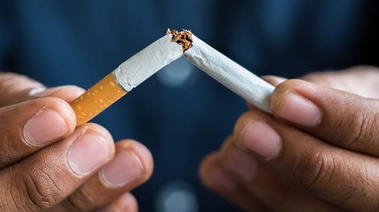Does Nicotine Cause Cancer?
We know that tobacco products are linked to cancer and are therefore worth quitting. There are numerous harmful chemicals in tobacco products, including nicotine. Nicotine is an addictive substance that makes it harder to quit smoking, but does it also cause cancer? While more research is needed, recent studies show that nicotine may influence several important steps in the development of cancer, exacerbate the disease and make it more likely to return. The best way to quit using nicotine products is with nicotine replacement therapy.1 Find out more about this substance and its connection to cancer.
What Is Nicotine?
Nicotine is a chemical compound found in tobacco products, including smokeless tobacco products and e-cigarettes. It’s a highly addictive substance and is the reason why tobacco products are so hard to quit. Once you start smoking cigarettes, nicotine alters the chemicals in your brain so that you start to crave it.2 In addition, some tobacco products have additives that cause you to absorb large amounts of nicotine in just a few seconds.2
To quit nicotine without experiencing nicotine withdrawal, use nicotine replacement therapy (NRT) and slowly decrease your daily nicotine intake until you don’t need it at all. NRT products are different from tobacco products that contain nicotine, as they’re formulated without toxic chemicals and additives.2
Nicotine and Cancer
While nicotine is what makes cigarettes so addictive, it was never considered one of the main carcinogens, or cancer-causing ingredients, in cigarettes. However, recent studies have linked nicotine with the development and reappearance of cancer.1 Carcinogens, like some of the ones found in cigarettes, can damage your DNA, which is responsible for making new cells and directing each cell to do its job.3,4 When your DNA is damaged, your cells begin to proliferate before they’re fully developed. Cells that increase rapidly pick up more mistakes in their DNA, which can eventually turn into cancer.3,4
Recent studies have reported the following about nicotine:1
-
Nicotine may activate signaling pathways that cause your cells to multiply rapidly, leading the cells to mutate as described above.
-
Nicotine may decrease CHK2, a tumor suppressor and a line of defense against cancer.
-
Nicotine may increase the growth of new cells—this was shown in studies on tumor cells lining the breast, colon and lungs.
-
Nicotine may interfere with chemotherapy treatments, making them less effective.
These studies suggest that nicotine could be a carcinogen, but more research is necessary for conclusive evidence.1
What Other Chemicals Are in Cigarettes?
In addition to nicotine, there are other harmful chemicals in cigarettes, including:5
-
Carbon monoxide: A poisonous gas that replaces the oxygen in your blood, forcing your heart to work harder and damaging your lungs. Oxygen-deprived cells and tissues can result in health problems such as heart disease and stroke.
-
Tar: A sticky brown material that stains your teeth and fingers brown. Tar contains carcinogens and damages your lungs by narrowing your bronchials, the small tubes that carry oxygen to your lungs. This substance can also damage your cilia, or the small hairs in your lungs that prevent you from inhaling dirt and bacteria. This can cause lung diseases such as chronic obstructive pulmonary disease (COPD) and emphysema.
-
Benzene, arsenic and formaldehyde: All toxic chemicals in cigarettes that can cause cancer.
Nicotine Replacement Therapy
The nicotine in NRT products differs from the nicotine in tobacco products. Unlike tobacco products, NRT products don’t contain any toxic additives and are proven to be safe and effective.5 The purpose of NRT is to help you wean off nicotine while preventing uncomfortable withdrawal symptoms.6 This can reduce and end your intake of nicotine for good, therefore reducing your cancer risk. People who quit smoking cut their risk of lung cancer by 30% to 50% after 10 years compared to people who keep smoking.7






